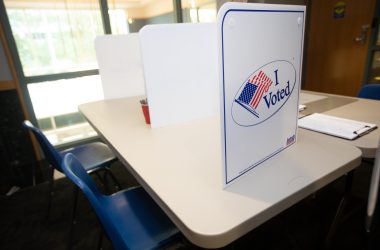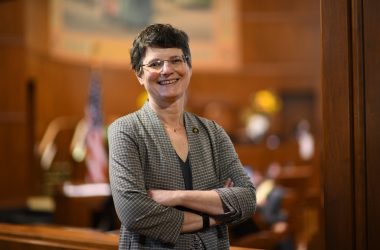 Fred Meyer store in Astoria (File/Daily Astorian)
Fred Meyer store in Astoria (File/Daily Astorian)
SALEM — Opponents of a ballot measure to ban taxes on groceries contend that some grocers have illegally used their employees to distribute political material supporting the ban.
The “Vote No on 103” campaign claims in a letter to Oregon grocers that such conduct violates state law that prohibits coercing workers into employer-mandated political activity.
Major grocers, including Albertsons Safeway and Costco, have bankrolled the effort to prohibit taxes on grocery products, Secretary of State records show. Ballot Measure 103 is on the Nov. 6 statewide ballot.
The Yes on 103 campaign denied the allegations, saying its campaign staffers were distributing the items and customers could take them at will.
Monday’s letter is the latest volley in what has become an acrimonious campaign over whether Oregon, which has no sales tax, should especially protect grocery items for state taxes.
The measure is opposed by a coalition of progressive groups, which said in its letter that employees at Fred Meyer, Safeway, QFC and Albertsons stores in Portland, Eugene, Springfield and Roseburg were distributing flyers and magnets reading “Keep Our Groceries Tax Free,” and telling customers to vote for Measure 103.
“Oregon grocers are engaging in a deceptive campaign where they claim that Measure 103 is necessary to ensure that food is not taxed,” wrote attorney Margaret Olney in a letter to grocers on Monday, Sept. 24. “While they can make this position known in their stores, they cannot require employees to personally deliver that message to customers. We are writing to each grocery retailer to demand that it stop.”
Olney also wrote that the campaign would “explore all possible avenues for challenge, including election law complaints and civil actions against the employers” if the grocers didn’t stop.
She also said that any time employees spent distributing the flyers and magnets should be disclosed as in-kind contributions to the Yes on 103 campaign.
Katherine Driessen, a spokeswoman for the “No” campaign, said that “multiple customers and staff” reported employees were distributing literature and magnets.
However, the Yes on 103 campaign in an email statement late Monday labeled such claims “false accusations.”
“The Yes on 103 campaign material that is referenced in this letter was distributed and placed by the campaign at store check stands,” wrote Dan Floyd, a spokesman for the campaign. “Individuals may take a magnet and literature or not as they see fit.”
The two campaigns disagree what goods the measure would protect from taxation.
Supporters of Measure 103 said the prohibition covers “any raw or processed food or beverage intended for human consumption.” Opponents claim the measure would apply to a broader range of goods and entities, including restaurants.
That disagreement and public statements by the opposition campaign prompted a lawyer for the Yes on 103 campaign to send a cease-and-desist letter to the opponents Sept. 10, claiming they had violated state law by making “false statements” in campaign materials about the measure, and demanding they stop.
“My client has been, and continues to be, damaged by numerous false statements made by Vote No on 103 and its coalition members regarding Measure 103,” wrote attorney Jill Gibson.
The Vote No on 103 campaign shot back Sept. 18, denying that it published any false statement.
“Your client needs to apologize for making its false accusations and needs to retract its defamatory statements,” wrote attorney Steve Berman.
Reporter Claire Withycombe: [email protected] or 503-385-4903. Withycombe is a reporter for the East Oregonian working for the Oregon Capital Bureau, a collabaration of EO Media Group, Pamplin Media Group, and Salem Reporter.









